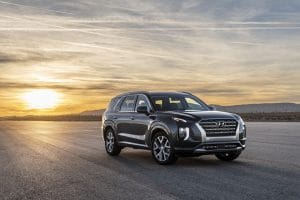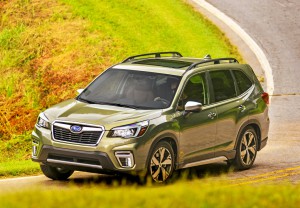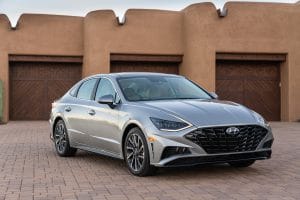The tough times for automakers in the U.S. continued in August with Hyundai, Toyota and Subaru all reporting year-over-year sales declines last month — which was in line with industry expectations.
Hyundai Motor America reported an 8% decline compared with August 2019. Retail sales were down 2%. Hyundai fleet sales were down 63% and represented 4% of total volume.
Hyundai, however, noted, there were three additional selling days in August 2019 and Labor Day holiday weekend sales were included in last year’s August numbers. On a daily selling rate basis, Hyundai retail sales increased 7% year over year. Industry forecasts predicted a 20% drop in total sales for the entire industry.
(Auto buyers’ customer service satisfaction plummets in pandemic.)
“Despite a down market, our SUVs continue to drive sales and deliver results for us and our dealers,” said Randy Parker, vice president, National Sales, Hyundai Motor America. “Our entire line-up performed well, but Palisade led the pack and is one of the fastest selling vehicles in the industry. Sonata sales were up, because customers still want great, high-quality, safe sedans.”
Parker estimated Hyundai increased its retail market share nearly a full percentage point on the year, the biggest gain in the industry. Multiple carmakers, among the General Motors, Fiat Chrysler, Ford and Volkswagen no longer report monthly sale totals and instead report on a quarterly basis.
Hyundai sold 55,915 retail units in August, with SUVs representing 67% of the total retail mix. Hyundai SUV retail sales grew 8%. Retail sales of the flagship SUV Palisade were up 56%, while Kona retail sales jumped 22 percent.
Toyota Motor North America reported that Toyota sales dropped 18.8% on a daily sales rate basis and 24.5% on a volume basis. Lexus sales dropped 2.5% on the daily sales rate an 9.5% on a volume basis. Total TMNA hybrid sales are up 5.8% on a volume basis for the calendar year.
Subaru of America also reported a 17% decrease compared with record August 2019. These results reflect the impact of the COVID-19 global pandemic and the uncertainty surrounding economic recovery.
(Labor Day auto sales expected to be hot with sedans the big draw.)
So far in 2020, Subaru reported a 21% decrease compared with the same period in 2019.
August, though, marked the fourth consecutive month of 50,000-plus vehicle sales for the automaker. As the top performing carline by volume, Forester sales increased 1% in August 2020 compared with the same month a year ago. BRZ posted a nearly 69% increase compared to August 2019.
“Thanks to the dedicated efforts of our retailer network, we are able to count August as the best sales month of 2020,” said Thomas J. Doll, president and CEO, Subaru of America Inc. “Our retailers are continuing to sell at very high levels of sales efficiency given their on-ground inventory levels while at the same time providing a Love Promise customer experience. We are grateful for their outstanding efforts.”
ALG Inc., which helps determine the future resale value of a vehicle, projects average transaction prices rose 3.9% or $1,370 from a year ago but down 0.3% or $106 from July 2020.
“Vehicles are continuing to sell at higher transaction prices when compared to the prior year even amidst the pandemic,” said Eric Lyman, chief industry analyst for ALG, a subsidiary of TrueCar.
“However, we are seeing month-over-month declines in average transaction price since May due to pullbacks on the richer automaker incentives that were in the market at the beginning of the pandemic. Consumers leaned into those offers to upgrade to higher priced trims and models which drove up transaction prices.”
(The long Labor Day weekend means saving long green on a new vehicle.)
“For the second month in a row, since March, automaker revenue for new vehicle sales will be up month-over-month by almost 6 percent. This is a positive sign for the auto industry as targeted incentive spending by automakers continue to fuel the recovery for new vehicle sales,” added Lyman.



